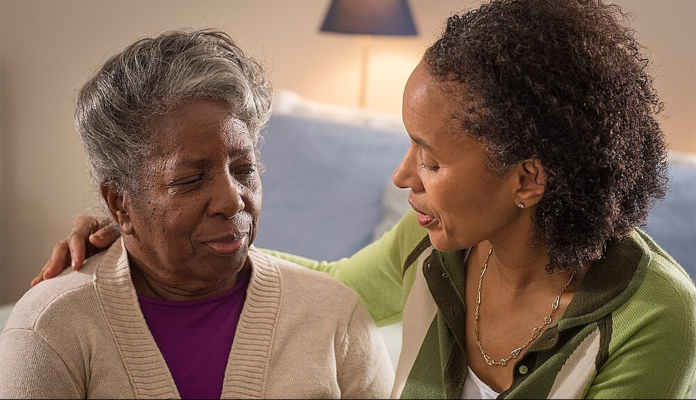Based on research conducted for caregiving in the U.S., African Americans often have more burdensome caregiving situations than their non-Hispanic white or Asian caregiver counterparts. We also tend to be younger, are often unmarried, have poorer health, and frequently have to balance caregiving with full-time jobs.
Whew! A lot to process!
The research would suggest that African American caregivers should be highly stressed. But other research over the past 20 years has found we cope better with caregiving than white caregivers.
A study published in the journal The Gerontologist, found that African American dementia caregivers had somewhat better psychological well-being than white dementia caregivers. The authors offered several possible reasons, including the expectation among African Americans that family and community members will look out for one another and their relatively greater commitment to religious practices and values.
When there is a role reversal, the child has to assume the role of a parent. Figuring out an elderly parent or loved one’s needs, understanding options, and them, having to make decisions for them can feel overwhelming. But someone has to do it!
You want to make sure your elderly loved ones remain healthy, happy, and safe. Sometimes providing eldercare support can be fairly straightforward: a little help with transportation, or arranging for some assistance with shopping or household chores. But in other cases, family members find themselves having to take on quite a lot. This is often due to health issues affecting the older person’s ability to remain independent and manage various aspects of life.
Before you decide…
If you plan on becoming a caregiver to an elderly loved one, do consider the following situations that can come up:
1) Daily living needs–Does your loved one need help with transportation, finances, shopping, meals, home maintenance, housing?
2) Safety–Are there safety issue concerns with driving, falls, and financial vulnerability?
3) Health–Does your loved one suffer from chronic conditions like heart disease or diabetes that require medication monitoring? Do they feel lost after doctor visits because they did not understand what was being advised?
4) Financial–Have your loved ones lost their ability to manage their finances? Are they vulnerable to financial exploitation?
5) Housing–Is your loved one’s current housing a good fit for aging in place? Does the home present safety concerns?
6) Planning ahead–Is there a plan in place for future declines, emergencies, and end-of-life care?
7) Family dynamics–Are there family issues that need ironing out? Oftentimes family relationship challenges might threaten an elderly person’s independence or dignity.
8) Self-care–Is the senior in your life neglecting their own needs and well-being which can result in overall health dangers?
How to proceed…
After assessing the eight points, your plan of action for your elderly loved one should involve taking notes in a caregiving notebook to be clear on what is needed.
Ask yourself these questions and be honest:
- Does your health allow you to physically care for someone?
- Do you live close enough to visit as often as needed?
- Would you want to live with them, either in their house or yours?
- Do you have the kind of relationship that allows you to spend a lot of time together without creating a lot of negative feelings on either side?
- Do you have the personality/patience/energy to provide the type of care they need?
- Are you willing to learn how to provide that care?
Include your loved ones in the decision-making process of their care. This helps them see you more as a partner rather than someone who’s swooping in to make changes.
Sure, you want your elderly loved ones to be safe and healthy and it is not selfish, if you are not the best person to assume the role of a caregiver. Thankfully there are aging care options that you can trust and rely on to advise you.
- Geriatric care managers – they can act as consultants to guide you or they can manage all aspects of caring for your parent. Their experience could save you time, money, and headaches down the road. The Eldercare Locator below will help you find one.
- In-home caregiving help – whether you hire privately or go through a home care agency, hired caregivers take care of seniors in their home
- Assisted living communities – if your parent isn’t able to live on their own or needs 24/7 care, assisted living and other senior housing options might be a wise choice
- Geriatricians (geriatric doctors) – specialize in caring for seniors and have more experience treating people with multiple chronic health conditions, dementia, and other conditions that primarily affect older adults
- Area Agency on Aging – this is the county-level government office that serves local seniors. It’s a great starting point because they connect you with helpful local resources and government programs. eldercare.acl.gov











